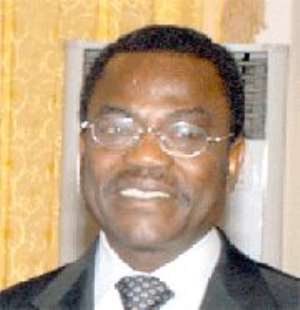
The Bank of Ghana spent a total of $66.2 million — about GH¢62.188 million (¢621.88 billion using current exchange rates) — on the re-denomination exercise, the Governor of the Bank of Ghana, Dr. Paul Acquah, has disclosed.
He said the figure represented a saving of $28 million, if compared with the $94.8 million spent in 2003 and 2006 to replace worn out notes and coins and top up the existing currency in circulation.
Answering questions from journalists at a press conference in Accra yesterday, Dr Acquah said the expenditure covered the total cost of the re-denomination exercise, including the printing and minting of Ghana cedi notes and coins and the multimedia campaign, among others.
“I prefer to call it savings because we now have to spend less to annually top up or replace currency in circulation,” Dr Acquah explained.
The press conference was organised by the Central Bank's Monetary Policy Committee, which is chaired by the Governor, to brief the media on current developments in the economy and the way forward.
The governor said the exercise, which slashed four zeros from the old currency, gave the country the opportunity to replace millions of notes and coins of the old currency with fewer notes and coins, which matched the value of the old ones.
He said while subsequent replacement and topping up of currency in circulation would cost less, the exercise had also made enough currency available to purchase cocoa beans during the next crop season.
At the end of October this year, the BoG had withdrawn 89 per cent of the old currency in circulation, which the governor explained signalled that the end of the exercise was in sight.
Over 90 per cent of both the ¢20,000 and ¢10,000 notes had been retrieved, but the withdrawal of coins is much slower.
As of now, only 15.23 per cent of the coins had been withdrawn. The reason is that it was more cumbersome to haul the much bulkier coins to change at the banks as compared to notes.
By the close of this year, the cedi will cease to be legal tender, but would continue to be exchanged for the Ghana Cedi at the banks.
Since the beginning of July this year, when the new Ghana Cedi was introduced, it has been circulating side-by-side the cedi to enable the public to understand and adjust to the Ghana Cedi.
On counterfeiting, the governor gave the assurance that the security apparatus was on guard to apprehend any unscrupulous individuals who perpetrate the crime, saying, “The security forces are aware of the money being spent and are determined to expose any such criminal activities.”
On the economy, Dr Acquah said growth was robust and the economy was resilient to shocks such as the rising crude oil prices and interruptions in domestic power supply.
“The indications are that Gross Domestic Product (GDP) growth is estimated to have eased to 6.4 per cent for the year, a slight mark down from an initial forecast of 6.5 per cent,” the governor said.
The central bank's measurement of economic activity, which it calls the Composite Index of Economic Activity, indicated that economic activity picked up during the third quarter of the year, as the index rose by 15.27 points or 5.1 per cent over the previous quarter which ended in June.
The prices of the country's major commodities also appreciated, with gold increasing by 18.4 per cent since January to September and 22.9 per cent when compared with the same period last year.
The country's Gross International Reserves, which stood at $1.81 billion at the end of September this year, represented an increase of 1.7 per cent when compared with the same period last year.
This means that the reserves can cover total imports for the country up to 2.2 months.
Private inward remittances received by non-governmental organisations (NGOs), embassies, service providers and individuals through the financial system amounted to $4.78 billion at the end of the nine months.
A total of $1.18 billion accrued to individuals as compared with the $1.11 billion which accrued to them for the same period last year.
Dr Acquah advised the government to make the 2008 budget reflect fiscal control and that policies should align monetary tightening to augment the financial stability and growth that the economy was currently experiencing.




 We’ll no longer tolerate your empty, unwarranted attacks – TUC blasts Prof Adei
We’ll no longer tolerate your empty, unwarranted attacks – TUC blasts Prof Adei
 Bawumia donates GHc200,000 to support Madina fire victims
Bawumia donates GHc200,000 to support Madina fire victims
 IMF to disburse US$360million third tranche to Ghana without creditors MoU
IMF to disburse US$360million third tranche to Ghana without creditors MoU
 Truck owner share insights into train collision incident
Truck owner share insights into train collision incident
 Paramount chief of Bassare Traditional Area passes on
Paramount chief of Bassare Traditional Area passes on
 Two teachers in court over alleged illegal possession of BECE papers
Two teachers in court over alleged illegal possession of BECE papers
 Sunyani: Victim allegedly shot by traditional warriors appeals for justice
Sunyani: Victim allegedly shot by traditional warriors appeals for justice
 Mahama vows to scrap teacher licensure exams, review Free SHS policy
Mahama vows to scrap teacher licensure exams, review Free SHS policy
 Government will replace burnt Madina shops with a new three-story, 120-store fac...
Government will replace burnt Madina shops with a new three-story, 120-store fac...
